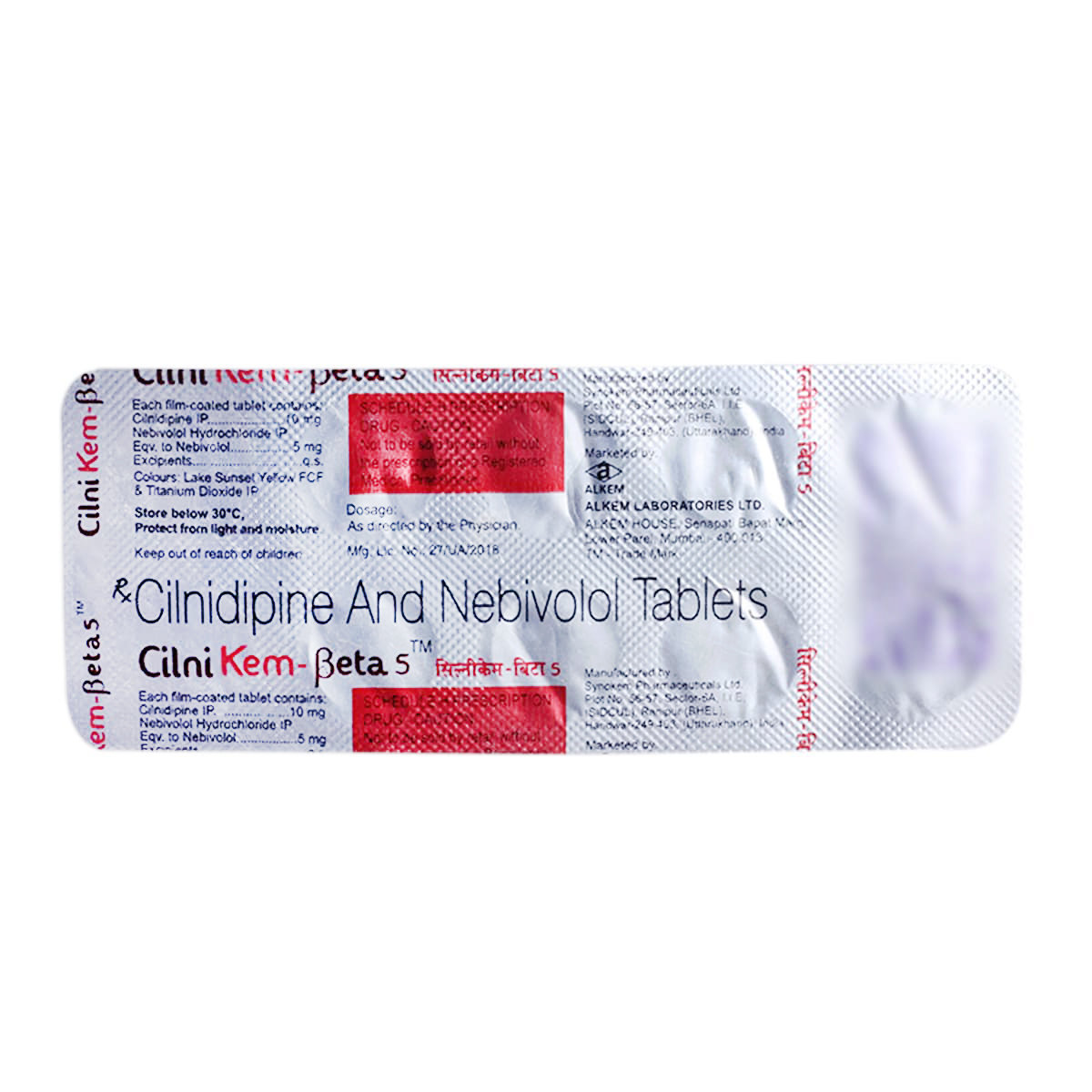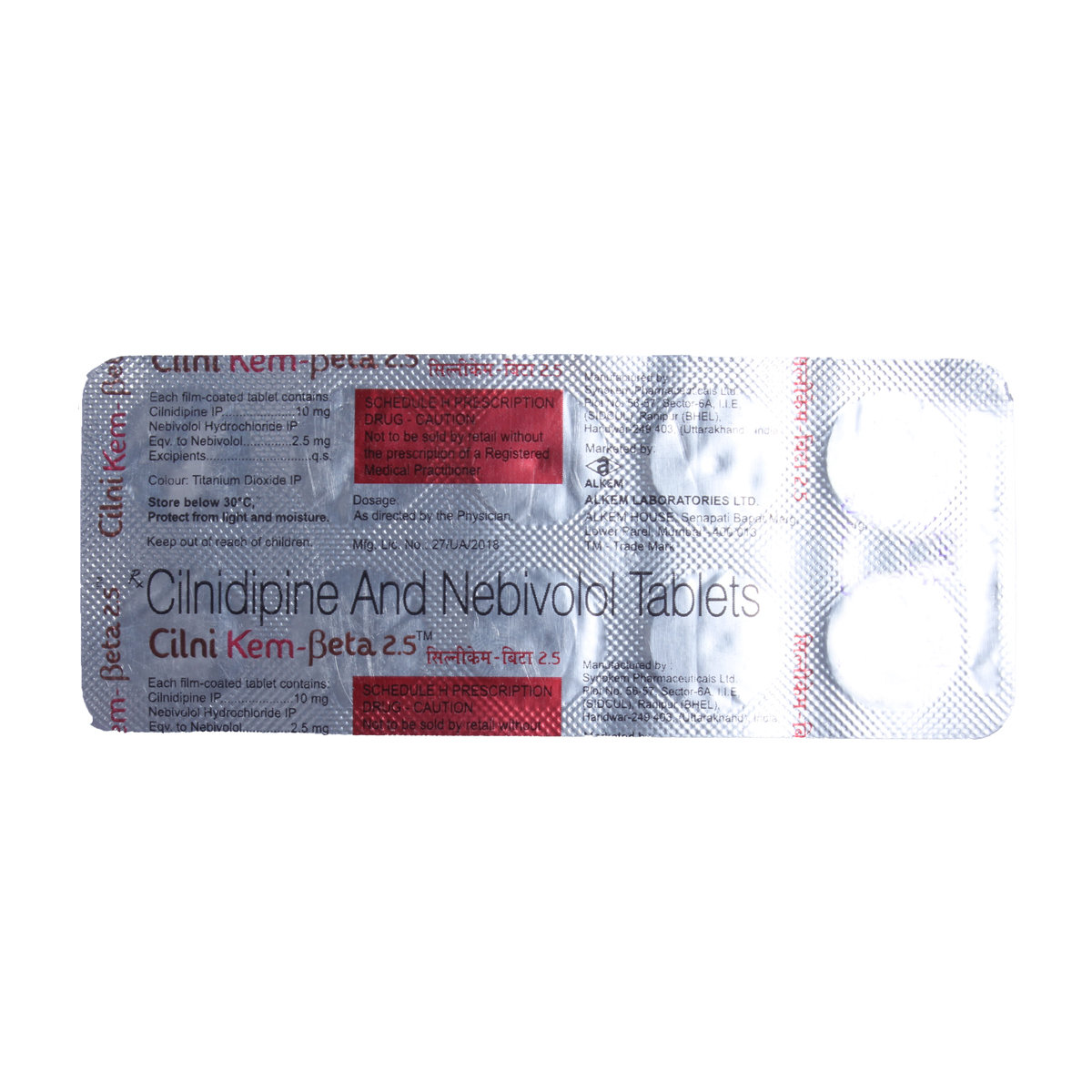Cilnidipine+nebivolol
About Cilnidipine+nebivolol
Cilnidipine+nebivolol belongs to a class of medications called 'Anti hypertensives' primarily used to treat high blood pressure. Cilnidipine+nebivolol is a combination of two drugs namely Cilnidipine (Calcium channel blocker) & Nebivolol (Beta blocker). Hypertension is a disease associated with increased blood pressure inside blood vessels. Hypertension is a long-term disease that can lead to complications like heart attack, heart stroke & long-term kidney diseases.
Cilnidipine+nebivolol is a combination of two medicines: Cilnidipine & Nebivolol, which help lower raised blood pressure effectively. Cilnidipine is a blood pressure-lowering drug belonging to the family of calcium channel blockers. It helps to control blood pressure by blocking action at the N-type calcium channel which dilates both arteriole & venules as a result the pressure in the capillary bed is reduced. This allows the blood to flow more smoothly and the heart to pump more efficiently. Nebivolol is another blood pressure lowering drug that belongs to a class called beta blockers, it works by relaxing blood pressure & slowing heart rate to improve blood circulation and decrease blood pressure. Together, they are used to treat patients with hypertension who cant be treated with a single drug.
You can take Cilnidipine+nebivolol with food or without food. It should be swallowed with a glass of water. Do not chew, bite, or break it. Your doctor will advise you on how often you take your tablets based on your medical condition. In some cases, you may experience headache, nausea, dizziness, Tiredness, increased potassium level, constipation, edema, Cold extremities, and low blood pressure. Most of these side effects of Cilnidipine+nebivolol do not require medical attention and gradually resolve over time. However, if the side effects are persistent, reach out to your doctor.
Try not to stop taking this medicine of your own. Let your doctor know about this, as it may cause a rise in blood pressure and can increase the risk of getting heart disease and stroke. Inform your doctor if you are suffering from any kidney or liver or heart disease or are diabetic. If you are pregnant or breastfeeding, please tell your doctor so that the dosage of Cilnidipine+nebivolol can be prescribed accordingly. It should not be given to children less than 12 years of age. Do not use Cilnidipine+nebivolol if you have low blood pressure (hypotension), or cardiogenic shock (sudden stopping of blood flow to the heart). Please tell your doctor if you are taking any other medicines or are allergic to Cilnidipine+nebivolol. Reducing the amount of table salt (sodium chloride) in your food often relieves the body's swelling. It would be best to have regular potassium and electrolytes level check-ups while taking Cilnidipine+nebivolol to prevent any complications.
Uses of Cilnidipine+nebivolol
Medicinal Benefits
Cilnidipine+nebivolol is primarily used to treat hypertension (high blood pressure). It is a combination of two medicines: Cilnidipine & Nebivolol, which help lower raised blood pressure effectively. Cilnidipine is a calcium channel blocker that acts by relaxing blood vessels thus decreasing the blood pressure to normal levels. This allows the blood to flow more smoothly and the heart to pump more efficiently. Nebivolol is a beta blocker that helps in relaxing our heart by blocking the action of certain natural substances in your body. This lowers your blood pressure and reduces your risk of having a future stroke, a heart attack, other heart problems or kidney problems in the future. This medicine needs to be taken regularly to be effective.
Directions for Use
Storage
Side Effects of Cilnidipine+nebivolol
- Headache
- Slow heart rate
- Constipation
- Cold extremities
- Nausea
- Sleepiness
- Tiredness
- Palpitations
- Ankle swelling
- Flushing (warm cheeks, necks, ears)
Drug Warnings
Talk to your doctor or pharmacist before taking Cilnidipine+nebivolol if you experience shortness of breath or dizziness or abnormally slow heart rate, have heart diseases due to decreased blood flow to heart muscles, have poor blood flow towards extremities of body such as finger, hands, and feet (Raynaud’s disease), experience pain, tension and weakness in the legs when walking which is relieved by rest, have a persistent obstruction of your airway such as chronic bronchitis, have diabetes, as it can hide the warning signs of low sugar levels or overactivity of the thyroid gland (hyperthyroidism). Also, inform your doctor if you are being treated with any other drugs which lower your blood pressure.
Drug Interactions
Drug-Drug Interaction: Care should be exercised when Cilnidipine+nebivolol is taken with quinidine(used for irregular heartbeat), phenytoin (anti-seizure medication), rifampicin (antibiotic), erythromycin (antibiotic), antipsychotics & hypertensive drugs.
Drug-Food Interaction: Cilnidipine+nebivolol should not be taken with grape juice as it may decrease the drug's absorption.
Drug-Disease Interaction: Cilnidipine+nebivolol should not be used in people affected with diabetes, irregular heartbeat, low blood pressure, allergy & diseases in which low blood circulation towards hands and feet is experienced.
Drug-Drug Interactions Checker List:
Safety Advice

Alcohol
cautionTaking this drug with alcohol may lead to decreased blood pressure thus not recommended.

Pregnancy
unsafeShould not be used during pregnancy, unless clearly necessary. Consult a doctor before taking the medicine.

Breast Feeding
cautionDoctors consultation is recommended as there is no data available whether this drug is passed through mothers milk to infant.

Driving
cautionIt may cause sleepiness and drowsiness thus not used before driving.

Liver
cautionMild side effects have been reported with the use of Cilnidipine+nebivolol, thus doctor's consultation is required with its use.

Kidney
cautionpatients with kidney problem should consult a doctor before taking this medication as this drug may affect blood circulation to the kidneys

Children
unsafeNot to be used in children below 12 years as there have been cases of harmful interactions.
Habit Forming
Diet & Lifestyle Advise
- Keep your weight under control with BMI (Body Mass Index) 19.5-24.9.
- Do regular physical activity or exercise for at least 150 minutes per week, or about 30 minutes most days of the week. Doing this can help you to lower your raised blood pressure by about 5 mm of Hg.
- Opt for a diet rich in whole grains, fruits, veggies, and low-fat dairy products.
- Limit intake of sodium chloride (table salt) in your daily diet to 2300 mg per day or less than 1500 mg is ideal for most adults.
- If you are taking alcohol then only one serving for women and two servings for men is advisable.
- Quitting smoking is the best strategy to lower the risk of heart disease. Avoid chronic stress as it can raise your blood pressure. Try to enjoy and spent time with your loved ones to cope with stress and practice mindfulness techniques.
- Monitor your blood pressure daily and if there is too much fluctuation then immediately contact your doctor.
- Try to include heart-healthy omega-3 fatty acids containing food drinks in your daily diet. You can also use low-fat cooking oil like olive oil, soybean oil, canola oil, and coconut oil can help in lowering your elevated blood pressure.
Special Advise
- Do not take this drug if you are allergic to either component of the drug.
- Do not take if a patient has a tumor in the adrenal gland, has asthma or wheezing (now or in the past)
- Keep consulting with your doctor for occasional checkups & dose adjustments.
Patients Concern
Disease/Condition Glossary
Hypertension: It is a chronic condition when blood pressure is too high. This condition can lead to hardened arteries (blood vessels), decreasing the blood and oxygen flow to the heart. Blood pressure is the measurement of the force that our heart uses to pump blood to all parts of the body. Raised blood pressure can cause chest pain (angina) and heart attack (when blood supply to the heart is blocked). Additionally, high blood pressure also causes brain damage (stroke) and kidney failure. You can have high blood pressure (hypertension) for years without any symptoms. Even without symptoms, damage to blood vessels and your heart continues and can be detected. Uncontrolled high blood pressure increases your risk of serious health problems, including heart attack and stroke. High blood pressure generally develops over many years, and it affects nearly everyone eventually. Fortunately, high blood pressure can be easily detected. And once you know you have high blood pressure, you can work with your doctor to control it.
FAQs
If you forget to take a dose, take it as soon as you remember. However, if it is almost time for your next dose, skip the missed dose and go back to your regular dosing schedule. Do not take a double dose to make up for a forgotten dose.
No, stopping the treatment without doctor's consultation may cause blood pressure to rise again, putting the person at risk for stroke and other complications of hypertension.
Cilnidipine+nebivolol and contraceptives as such are safe to use as no interaction between them has been reported, yet doctors consultation is recommended






